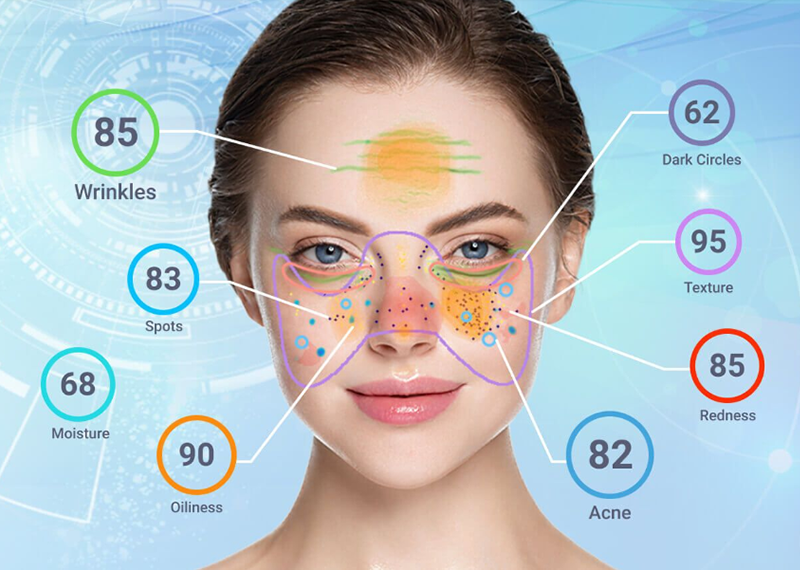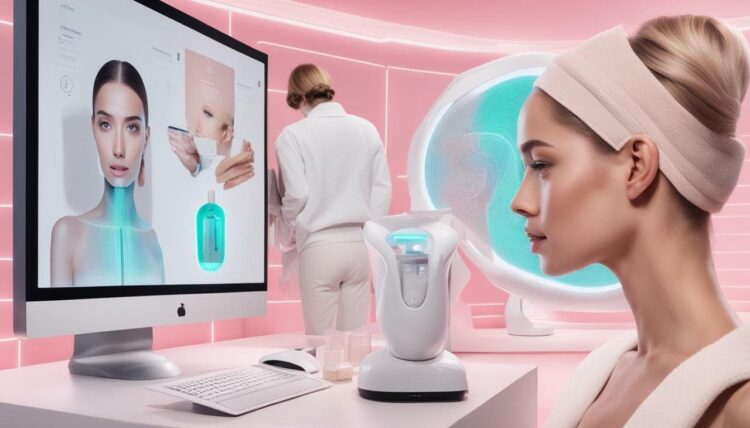In the rapidly advancing world of beauty and wellness, the quest for truly effective skincare has always been deeply personal, yet often fraught with trial and error. What works wonders for one person might cause adverse reactions for another, highlighting the inherent complexity of individual skin needs. Historically, achieving an optimized skincare regimen relied heavily on guesswork, generic product recommendations, or expensive consultations with dermatologists. However, a revolutionary shift is now underway. Artificial intelligence (AI) is rapidly transforming the skincare industry, moving beyond one-size-fits-all solutions to offer unprecedented levels of personalization. This isn’t just a trend; it’s a paradigm shift towards hyper-tailored routines, promising enhanced efficacy and a more sustainable approach to beauty. For consumers seeking optimal skin health and for content creators aiming for high Google AdSense revenue, understanding the intricate ways AI is redefining skincare is paramount. This comprehensive article will delve into the core mechanisms of AI in skincare, explore its myriad applications, discuss its transformative benefits, and examine the exciting future it holds for personalized beauty.
The Problem with Generic Skincare: Why One Size Doesn’t Fit All
For decades, the skincare industry thrived on broad categorizations: “oily skin,” “dry skin,” “sensitive skin,” “anti-aging,” “acne-prone.” While these classifications offered a starting point, they vastly oversimplified the nuanced reality of human skin. Each individual’s skin is a unique canvas, influenced by a complex interplay of internal and external factors.
The limitations of generic skincare include:
- Diverse Skin Types and Conditions: Even within broad categories, there’s immense variability. Two people with “oily skin” might have different underlying causes (e.g., genetics, hormones, diet), requiring different active ingredients.
- Environmental Factors: Climate (humidity, temperature), pollution levels, UV exposure, and even local water quality profoundly impact skin health, yet generic products rarely account for these dynamically.
- Lifestyle Habits: Diet, stress levels, sleep patterns, exercise routines, and even medication can significantly alter skin’s appearance and health, demanding adaptable solutions.
- Genetic Predispositions: Our DNA plays a crucial role in determining skin sensitivity, collagen production, propensity for certain conditions (like rosacea or eczema), and how our skin ages. Generic products cannot account for these inherent traits.
- Ingredient Sensitivities and Allergies: Many individuals react negatively to common skincare ingredients (e.g., fragrances, certain preservatives, strong actives), leading to irritation, breakouts, or allergic reactions. Generic formulations cannot predict or avoid these.
- Evolving Needs: Skin changes over time due to age, seasonal shifts, hormonal fluctuations, and personal health. A routine effective in your 20s might be inadequate in your 40s, and a summer routine may not suffice for winter.
- Product Overload and Confusion: The sheer volume of products on the market can be overwhelming, leading consumers to buy unnecessary or incompatible items, often resulting in “product cocktailing” that can harm the skin.
This inherent lack of personalization often leads to disappointing results, wasted money, frustrated consumers, and, in some cases, exacerbated skin issues. This is precisely where the power of AI steps in, offering a data-driven path to true individualization.
The Mechanics of AI in Skincare: How it Works
Artificial Intelligence in skincare is not a single technology but a convergence of several sophisticated computational approaches designed to process vast amounts of data, learn from patterns, and make highly specific recommendations or formulations.
A. Data Collection and Input Channels
The foundation of any AI system is data. In skincare, this data is rich and multi-faceted, gathered through various advanced input channels:
- High-Resolution Image Analysis: This is a cornerstone. Users submit selfies or professional clinics use specialized imaging devices that capture intricate details of the skin. AI algorithms, particularly computer vision and deep learning, analyze these images for:
- Texture irregularities: Roughness, smoothness, pore size and visibility.
- Color variations: Redness, hyperpigmentation (dark spots), uneven skin tone.
- Structural elements: Fine lines, wrinkles, elasticity (based on image response to subtle movements or specialized devices).
- Specific conditions: Identifying patterns indicative of acne, rosacea, or eczema.
- Severity assessment: Quantifying the degree of a particular concern (e.g., wrinkle depth, redness intensity).
- User Questionnaires and Self-Reported Data: While subjective, these provide crucial context. AI systems leverage natural language processing (NLP) to analyze responses to detailed questions about:
- Lifestyle: Diet (vegan, omnivore), sleep habits, stress levels, exercise frequency, smoking/alcohol consumption.
- Environment: Geographic location (for pollution data, humidity, UV index), sun exposure habits, city vs. rural living.
- Current Routine and Product History: What products are being used, what results were seen, any past adverse reactions, known allergies/sensitivities.
- Skin Sensations: How the skin feels (tight, oily, itchy), common reactions (redness, breakouts).
- Specific Concerns: Acne, aging, dryness, dullness, dark spots, sensitivity, etc.
- Genomic Data (Emerging): Some advanced platforms integrate DNA analysis. By examining specific genetic markers, AI can predict predispositions for:
- Collagen degradation rates: How quickly skin might lose firmness.
- Antioxidant capacity: Natural ability to fight free radical damage.
- Inflammatory responses: Propensity for redness or irritation.
- Sensitivity to certain ingredients.
- Environmental Data Feeds: AI platforms can pull real-time or historical data from external sources, including:
- Local weather APIs: Temperature, humidity, UV index.
- Air quality APIs: Pollution levels (PM2.5, ozone, etc.) relevant to the user’s location.
- Water quality data.
- Wearable Tech and Smart Device Integration (Future): In the future, AI could synthesize data from smart patches or wearables that monitor skin hydration, pH levels, or even trans-epidermal water loss (TEWL) in real-time.
B. AI Algorithms and Machine Learning (ML) Models
Once data is collected, sophisticated AI algorithms, primarily rooted in machine learning, analyze these vast and diverse datasets.
- Deep Learning (Neural Networks): Particularly effective for image recognition. Deep learning models are trained on millions of skin images (categorized by dermatologists) to accurately identify skin conditions, measure features (like wrinkle depth or pore size), and track changes over time with remarkable precision.
- Predictive Analytics: ML models analyze patterns in aggregated data (e.g., “users with X skin type in Y climate using Z product achieved A results”) to predict likely outcomes for new users. This helps recommend ingredients or routines that have historically been effective for similar profiles.
- Recommendation Engines: Similar to those used by streaming services or e-commerce sites, these engines suggest specific products, ingredients, or lifestyle adjustments based on the user’s profile and the efficacy data. They learn from user feedback (e.g., “this product worked for me”) to refine future recommendations.
- Natural Language Processing (NLP): Used to understand and interpret text-based input from questionnaires, customer reviews, or even chat interfaces, extracting key insights about user preferences and concerns.
C. Output and Personalization Mechanisms
The outcome of AI’s analysis is a highly personalized output, delivered through various channels:
- Personalized Product Recommendations: Instead of generic anti-aging creams, AI might recommend a specific serum with a precise concentration of a certain active ingredient, combined with a particular moisturizer and cleanser, all tailored to the user’s unique profile.
- Custom Skincare Formulations: Some cutting-edge companies use AI to directly formulate and blend custom serums, creams, or cleansers in real-time. Based on the AI’s analysis of the user’s needs, specific active ingredients (e.g., Vitamin C, hyaluronic acid, niacinamide) are combined in optimal concentrations and bases. This might involve robotic systems mixing ingredients on demand.
- Dynamic Routine Adjustments: AI doesn’t just provide a static routine. It can adapt recommendations based on new data (e.g., seasonal changes, user feedback, new images). If you move to a drier climate, the AI might suggest a more hydrating moisturizer. If breakouts increase, it might suggest adjusting an active ingredient.
- Actionable Lifestyle Advice: Beyond products, AI can suggest specific lifestyle modifications—e.g., “consider increasing water intake,” “try stress-reduction techniques,” “ensure sufficient sleep”—based on correlations found in the data.
- Progress Tracking and Visualization: AI-powered apps allow users to upload periodic selfies, which the AI analyzes to track improvements (or regressions) in skin texture, pigmentation, or wrinkles, providing visual proof of efficacy and motivating adherence.
- Educational Content: AI can personalize educational content, explaining why certain ingredients are recommended for your specific skin concerns, fostering deeper understanding and trust.
Revolutionary Applications of AI in Skincare
The integration of AI is creating entirely new possibilities and enhancing existing practices across the skincare landscape.
A. Smart Skin Analysis Devices
Portable devices, often paired with smartphone apps, use AI and advanced sensors to perform at-home skin assessments.
- Handheld Scanners: These devices capture high-resolution images of the skin, sometimes utilizing multi-spectral light to analyze aspects invisible to the naked eye (e.g., underlying inflammation, sebum levels, sun damage). The accompanying app’s AI processes this data instantly.
- Smart Mirrors: Advanced mirrors in clinics or high-end retail spaces use facial recognition and computer vision to analyze skin conditions, offering real-time recommendations or even virtual product try-ons.
- IoT-Enabled Patches: Future developments may include smart patches that monitor skin parameters throughout the day, sending continuous data to an AI for dynamic adjustments to the routine.
B. Personalized Product Formulation
This is arguably the most exciting frontier, moving beyond recommendations to bespoke creation.
- Custom-Blended Serums: Companies like Proven Skincare or Function of Beauty’s skincare line use AI to formulate unique serums or moisturizers based on detailed user profiles, often freshly mixed and shipped to the consumer.
- On-Demand Manufacturing: AI can drive robotic systems in micro-factories to produce single-batch personalized products, reducing waste and inventory.
- Ingredient Optimization: AI can analyze vast databases of ingredient properties and interactions to determine the optimal concentrations and combinations for a given skin profile, ensuring stability and efficacy.
C. Virtual Skincare Assistants and Chatbots
AI-powered chatbots and virtual assistants provide accessible, round-the-clock skincare advice.
- Symptom Analysis: Users describe their skin concerns, and the AI chatbot asks clarifying questions, cross-referencing with a knowledge base to offer preliminary diagnoses or product suggestions.
- Routine Building: Guiding users step-by-step through building a personalized routine based on their input.
- Ingredient Explanation: Providing detailed information about specific ingredients and their benefits or potential side effects for the user’s skin type.
- 24/7 Support: Offering instant answers to common skincare questions without human intervention.
D. AI-Powered Diagnostics and Dermatological Support
While not replacing dermatologists, AI can enhance their practice and improve access to care.
- Pre-Screening for Conditions: AI can analyze images to identify potential skin conditions (e.g., melanoma, rosacea, severe acne) and flag them for professional review, aiding early detection.
- Tracking Disease Progression: For chronic conditions, AI can objectively track the severity and progression of a condition over time, providing valuable data for treatment adjustment.
- Remote Consultations: AI tools facilitate tele-dermatology, allowing specialists to assess skin conditions from afar with higher precision.
E. Smart Sun Protection
AI is also being leveraged to provide highly personalized sun safety advice.
- UV Exposure Tracking: Apps integrated with weather data can calculate a user’s cumulative UV exposure throughout the day and recommend reapplication times or shade seeking.
- Personalized SPF Recommendations: Based on skin type, location, and planned activity, AI can suggest the optimal SPF level and reapplication frequency.
- Sun Damage Assessment: AI can analyze skin images for signs of sun damage (e.g., hyperpigmentation, uneven texture) and recommend corrective strategies.
Transformative Benefits of AI in Skincare
The integration of AI into skincare delivers a multitude of compelling benefits for both consumers and the industry.
A. Unprecedented Personalization
This is the cornerstone benefit. AI moves beyond generic product lines to offer solutions truly tailored to an individual’s unique and dynamic skin profile. This means:
- Highly Targeted Solutions: Addressing specific concerns with precision, rather than broad-stroke treatments.
- Optimized Ingredient Combinations: AI can identify synergistic ingredients and avoid antagonistic ones, maximizing efficacy.
- Dynamic Adaptability: Routines can evolve with seasons, age, lifestyle changes, and new concerns.
B. Enhanced Efficacy and Results
When skincare is truly personalized, its effectiveness dramatically increases.
- Reduced Trial and Error: Consumers spend less time and money on products that don’t work.
- Faster Problem Solving: AI can quickly pinpoint potential issues and suggest solutions, leading to quicker improvement in skin health.
- Proactive Care: By analyzing data, AI can sometimes predict potential issues before they become severe, enabling preventative measures.
C. Cost and Time Efficiency
For consumers, AI can be a significant money and time saver.
- Less Wasted Product: Fewer ineffective purchases mean less money spent on products that end up unused.
- Streamlined Routine: Removing unnecessary steps or products simplifies daily care.
- Reduced Need for Frequent Consultations: AI can provide preliminary advice, saving time and cost on initial specialist visits for common concerns.
D. Increased Accessibility and Democratization of Expertise
AI democratizes access to sophisticated skin analysis and personalized recommendations that were once only available through expensive, in-person consultations.
- Global Reach: People in remote areas with limited access to dermatologists can receive personalized advice.
- Lower Barrier to Entry: Makes advanced skincare guidance more affordable and accessible to a wider demographic.
- Empowered Consumers: Provides users with a deeper understanding of their own skin and the science behind their routine.
E. Data-Driven Innovation for the Industry
For skincare brands and researchers, the data generated by AI personalization is invaluable.
- Identify Emerging Trends: AI can spot patterns in collective skin concerns or ingredient preferences across millions of users.
- Accelerate Product Development: Data insights inform the creation of new, more effective products that address real consumer needs.
- Improve Clinical Trials: AI can help identify ideal candidates for trials and track outcomes with greater precision.
- Sustainable Practices: By enabling on-demand, personalized manufacturing, AI can reduce overproduction, waste, and supply chain inefficiencies, contributing to a more sustainable beauty industry.
Challenges and Considerations for AI in Skincare
While the future of AI in skincare is bright, several challenges and ethical considerations must be addressed for its widespread and responsible adoption.
A. Data Privacy and Security
The collection of highly personal data (images, health information, genetic data) raises significant privacy concerns.
- Secure Storage: Ensuring robust cybersecurity measures to protect sensitive user data from breaches.
- Ethical Use of Data: Transparency about how data is used, shared, and anonymized. Avoiding discriminatory uses of data.
- User Consent: Clear, explicit, and informed consent from users for data collection and analysis.
B. Accuracy and Reliability of AI Algorithms
The effectiveness of AI relies entirely on the quality of its training data and the sophistication of its algorithms.
- Bias in Data: If training datasets are not diverse (e.g., predominantly light skin tones), AI might perform poorly on certain demographics. Ensuring representation is crucial.
- False Positives/Negatives: AI might misdiagnose a condition or miss a critical issue, underscoring the need for human oversight, especially for medical conditions.
- Limitations of Self-Reported Data: Users might inaccurately describe their skin or lifestyle, leading to flawed recommendations.
C. Lack of Human Touch and Holistic Assessment
AI excels at data processing but lacks the nuanced understanding of a human expert.
- Emotional and Psychological Factors: A dermatologist can factor in a patient’s emotional state, adherence challenges, or specific psychological triggers for skin conditions, which AI currently cannot.
- Complex Cases: For rare or highly complex skin conditions, AI’s pattern recognition might be insufficient without human clinical judgment.
- Ethical Dilemmas: Who is responsible if an AI recommendation leads to an adverse outcome?
D. Regulatory Landscape
The regulation of AI in health and beauty is still nascent.
- Medical Device Classification: Are skin analysis apps considered medical devices? This impacts regulatory oversight and safety standards.
- Ingredient Safety: Ensuring AI-generated custom formulations adhere to all safety regulations for cosmetic and pharmaceutical ingredients.
E. Consumer Trust and Education
Building consumer trust in AI-powered solutions requires clear communication and demonstrable results.
- Transparency: Explaining how the AI works and why certain recommendations are made.
- Realistic Expectations: Managing expectations about what AI can and cannot do for skin health.
- Addressing Skepticism: Overcoming initial resistance to relying on technology for personal health decisions.
The Future Landscape: AI as Your Personal Skincare Scientist
The trajectory of AI in skincare points towards an even more integrated, predictive, and truly personalized future. Imagine a world where your skincare routine adapts in real-time, anticipating your needs before you even notice them.
A. Hyper-Personalized Ecosystems
Instead of just recommending products, AI will likely power comprehensive skincare ecosystems.
- Smart Bathrooms: Mirrors and lighting systems might continuously monitor skin, adjusting product delivery from integrated dispensers.
- Bio-Wearables: Micro-sensors in discreet patches or even embedded in clothing could monitor hydration, inflammation markers, and nutrient levels in the skin, feeding real-time data to your AI assistant.
- Micro-Dispensing Devices: Handheld devices that precisely mix and dispense fresh, custom formulations on demand each morning or evening, minimizing product degradation and waste.
B. Predictive and Preventative Skincare
AI’s ability to analyze patterns will move beyond reactive solutions to proactive prevention.
- Environmental Adaptation: Your routine automatically adjusts based on your real-time exposure to pollution, UV, and humidity in different locations.
- Lifestyle Integration: AI learns from your sleep data (from wearables), stress levels (from mental health apps), and diet (from food logging apps) to recommend pre-emptive skincare adjustments.
- Genetic Optimization: Deeper integration of genomic data for truly preventative care, identifying risks and recommending protective strategies years in advance.
C. Seamless Integration with Tele-Dermatology
AI will serve as an invaluable assistant to dermatologists, not a replacement.
- Automated Pre-Consultation Analysis: Patients submit data to AI before a virtual appointment, allowing dermatologists to review AI-generated reports and focus on diagnosis and treatment planning rather than data collection.
- Personalized Treatment Monitoring: AI can track how well a prescribed regimen is working, providing objective data to both patient and doctor for adjustments.
- AI-Assisted Drug Discovery: Accelerating the development of new, highly targeted skincare ingredients by simulating molecular interactions.
D. Sustainable and Ethical Beauty
AI’s precision and customization capabilities will drive greater sustainability.
- Reduced Waste: On-demand formulation minimizes mass production waste and unsold inventory.
- Optimized Resource Use: AI can identify the most sustainable ingredient sourcing and manufacturing processes.
- Transparent Supply Chains: Blockchain technology, potentially integrated with AI, can verify the ethical and sustainable origins of ingredients.
The Dawn of Intelligent Skincare

The integration of AI in personalized skincare routines marks a profound shift, moving the beauty industry from a broad-stroke approach to one of meticulous, data-driven precision. It promises to transform the frustrating cycle of trial and error into an empowering journey toward optimal skin health. By harnessing the power of advanced image analysis, predictive analytics, and dynamic adaptation, AI is making expert-level skincare insights accessible to a global audience, fostering enhanced efficacy, greater convenience, and potentially a more sustainable future for beauty. While challenges related to data privacy, algorithmic bias, and the irreplaceable human element remain, the trajectory is clear. As AI continues to evolve, it will increasingly serve as a highly intelligent, ever-learning personal skincare scientist, guiding us to routines that are not just effective, but truly harmonious with our unique, dynamic selves. Embracing this intelligent evolution is not just about looking better; it’s about fostering a deeper, data-informed understanding of our skin, paving the way for healthier, more confident lives, and for content creators, securing a valuable niche with high audience engagement.










